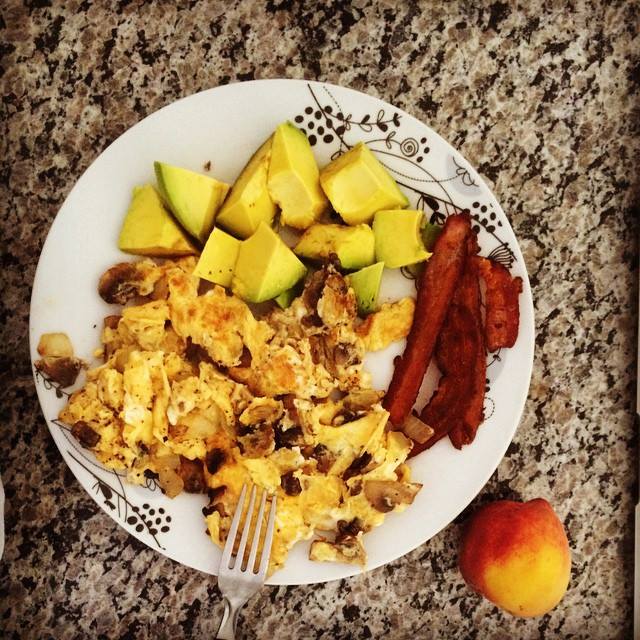
Focus on Food
Written by Melissa Hurley
We’re all busy running around, meeting deadlines, and conquering the world. Sometimes food seems like such an incredible time suck; shop for it, cook it, eat it. You eat while you’re driving, rushing to a meeting, or staring at the computer while finishing a task. It seems like there is never any time to slow down and just eat. Even if you’re eating healthy food, cramming it down on the go isn’t ideal. Want ultimate health? Focus on your food. Make it a priority to sit down and pay more attention to what you’re putting in your mouth. Here’s why…
Satiety and Food Intake
The first reason to sit down and eat calmly is that you’re much less likely to overeat. We all know that our body tells us when we’re hungry and when we’re full, but if you’re paying attention to your email or driving through rush hour while mechanically shoveling food in your mouth, you’re not listening to your body. If you’re distracted, that “I’m full” feeling doesn’t appear as quickly and it isn’t as strong. You can end up ignoring your body’s signals to stop eating.
A study in PubMed looked at people eating in four situations: driving, watching TV, talking to other people, and just eating alone. Among their findings:
- People who ate while they watched TV ate the most.
- People who ate alone had a lower desire to eat after finishing their food except if you were alone and driving. In other words, in a car, what people ate didn’t make them any less hungry. Crazy.
- Given the same amount of food, the distracted subjects felt less full after eating.
- Women who ate while playing a computer game didn’t feel as satisfied by their food as women who weren’t distracted [1].
Eating while distracted makes you much more likely to overeat, relative to your body’s actual needs. It takes more food to make you feel full, because the satiety signals have to shout over all the other noise in your brain before you can hear them. In addition, if you’re eating faster, you can and will eat more bites of food before that feeling of “I’m not hungry any longer” gets to your brain. Slow down, stop being distracted while you eat, and listen to your body. It’s much healthier and you may even lose some weight.
If you can’t sit down:
- Don’t eat out of the bag. Instead, serve yourself however much you want to eat, and put the container away. This will help prevent overeating even if you aren’t paying attention because there won’t be any more food within easy grabbing reach.
- Pack carrot sticks, bell pepper strips, or other finger-friendly vegetables with the meals you grab on the go.
- Instead of nuts for a quick protein source, make all-in-one meals: egg muffins, stuffed bell-peppers, quiche, stuffed sweet potatoes. A lot of foods can pack in the nutrients AND be finger-friendly.
- Try mason jar salads for a quick way to bring more vegetables to work for lunch.
Stress
Stress is another reason why rushed meals aren’t great. Sit-down meals give us time to relax, slow down, and switch from a “fight or flight” mode back to a “rest and digest.” Taking time to relax at lunch can help prevent any morning stress from snowballing into a nightmare in the afternoon. The break can give you a chance to breathe and get some perspective on your situation. Winding down at dinner can help you relax after anything that might have happened during the workday so you’re less likely to lose sleep over it. Undistracted, sit down meals can help you manage the constant influx of stress. Take them out and you’ve done away with a major stress management tool.
Digestion
Trying to eat while you’re in “fight or flight” mode also has negative consequences for your digestion. High-stress mode means that blood is directed away from your intestines and into your muscles, exactly the opposite of where you want that blood for digestion. If you’ve ever felt like food “sits like a brick in your stomach” after eating, this could be cause by being tense and stressed.
Cramming down meals on the go is not ideal. It makes most people more likely to overeat, it’s stressful (which can really mess with digestion), and it tends to steer people towards less-healthy options. There are some ways to do damage control, like making an effort to pack fresh vegetables or managing how much you’re eating. This is a good practice, but it’s always best to sit down, eat calmly, and savor your food. It’s definitely healthier and much more enjoyable.
References:
[1] “Distraction, the desire to eat and food intake. Towards an expanded model of mindless eating.” Appetite. 2013 Mar;62:119-26. doi: 10.1016/j.appet.2012.11.023. Epub 2012 Dec 5. Ogden J1, Coop N, Cousins C, Crump R, Field L, Hughes S, Woodger N.
[2] “Effects of distraction on the development of satiety.” Br J Nutr. 2006 Oct;96(4):761-9. Brunstrom JM1, Mitchell GL.
[3] “Independent and combined effects of eating rate and energy density on energy intake, appetite, and gut hormones.” Obesity (Silver Spring). 2013 Mar;21(3):E244-52. doi: 10.1002/oby.20075.